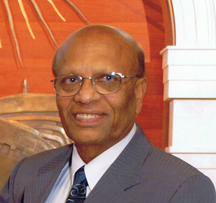A few years ago, I read a news report from an American journalist who said that the biggest and most moralistic temple in India is not any single religious temple but in Jamshedpur where Ratan Tata (the former head of the Tata Empire) has converted the whole city into a living temple. How he loves and takes care of his employees in that city is a demonstration of devotion more apparent than in any temple.
Ratan Tata was the chairman of Indian Hotels who owns the Taj Mahal Hotel Mumbai, which was the target of terrorists in 2008 (this was India’s 26/11). Hotel President, a five star property also belongs to Indian Hotels. The following account is really touching. What Ratan Tata did for the Mumbai victims...I salute and give honor to Shri Ratan Tata.
- All categories of employees, including those who had completed even one day as casual laborers, were treated as on duty during the time the hotel was closed.
- Relief and assistance were given to all those who were injured and killed.
- The relief and assistance was extended to all those who died at the railway station and surroundings including the “Pav- Bhaji”vendors and the pan shop owners.
- During the time the hotel was closed, the salaries for employees were sent to them by money order.
- A psychiatric clinic was established in collaboration with Tata Institute of Social Sciences to counsel those who needed such help.
- The thoughts and anxieties going on people’s minds were carefully tended and where needed psychological help was provided.
- Employee outreach centers were opened where all help, food, water, sanitation, first aid, and counseling was provided. 1600 employees were covered by this facility.
- Every employee was assigned to a mentor and it was that person’s responsibility to act as a “single window” clearance for any help that the person required.
- Ratan Tata personally visited the families of all the eighty employees who in some manner - either through injury or getting killed - were affected.
- The dependents of the employees were flown from outside Mumbai to Mumbai and taken care of in terms of ensuring mental assurance and peace. They were all accommodated in the Hotel President for three weeks.
- Ratan Tata himself asked the families and dependents for immediate feedback about what they wanted and needed him to do.
- In a record time of only twenty days, a new trust was created by the Tatas for the purpose of providing relief for employees.
- What is unique is that even the other people, the railway employees, the police staff, and the pedestrians —who had nothing to do with the Tatas —were covered by compensation. Each one of them was provided subsistence allowance of Rs. 10K per month for six months.
- The four-year old granddaughter of a vendor was struck by four bullets and only one was removed in the Government hospital. She was taken to Bombay hospital and several lakh rupees were spent by the Tatas on her to enable her full recovery.
- New handcarts were provided to several vendors who lost their carts.
- Tata took responsibility for the life education of forty-six children of the victims of the terror.
- This was the most trying period in the life of the organization. Senior managers, including Ratan Tata, were visiting funeral to funeral over the three days that were most horrible.
- The settlement for every deceased individual ranged from Rs. 36 to 85 lakhs (one lakh rupees translates to approx.. 2000 US$) in addition to the following benefits:
- a. Full salary for life for the family and dependents;
- b. Complete responsibility of education of children and dependents - anywhere in the world.
- c. Full access to medical facilities for the whole family and dependents for the rest of their lives.
- d. All loans and advances were waived off - irrespective of the amount.
- e. Access to a counselor for life was provided for each person.
- How was such passion created among the employees? How and why did they behave the way they did?
- The organization is clear that it is not something that an individual can take credit for. It is not some training and development that created such behavior. If someone suggests that - everyone laughs.
- It has to do with the “DNA” of the organization, with the way Tata culture exists and above all with the ethos that prevailed that time. The organization has always been reiterating that customers and guests are the first priority; in this situation, they had a chance to prove that.
- The hotel business was started by Jamshedji Tata when he was insulted in one of the British hotels and not allowed to stay there.
- He then created several institutions that later became icons of progress, culture, and modernity. The IISc (Indian Institute of Science) is one such institute. He was told by the rulers that time that he could only acquire land for IISc to the extent he could fence the same. He could afford fencing for only 400 acres.
- When the HR (human resource) function hesitatingly made a very rich proposal to Ratan Tata in the aftermath of the tragedy, he said, “Do you think we are doing enough?” focusing on what he could do for others and not on what he might receive. 7. The whole approach involved a generous and compassionate perspective: if the organization would spend several hundred crore in re-building the property - why not spend equally on the employees who gave their lives? This is the practice of ahimsa and does not need any further explanation.
 Dr. Sulekh Chand Jain
Dr. Sulekh Chand Jain
